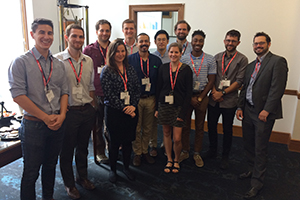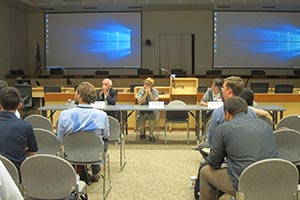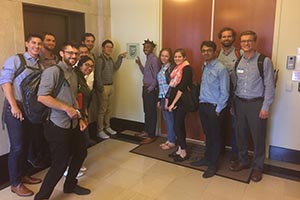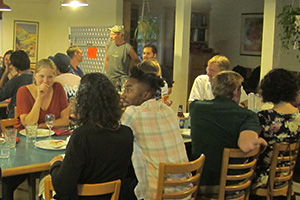In September, UC Davis welcomed the inaugural class of 16 UC Davis Energy Graduate Group students. During their first week on campus, students participated in an orientation program–Power Trip– to learn about the wide variety of energy related research and policy work being conducted at UC Davis and in the Sacramento/Bay area through discussions with researchers and leaders from industry, government, public interest groups, and academia.

Monday, September 11
By Nick Pappas
This marked the first day of Power Trip for incoming UC Davis Energy Graduate Group (EGG) students. In the morning, we learned about energy issues from EGG-affiliated faculty members. Professor Bryan Jenkins discussed the scale of the energy challenge, introducing concepts like KAYA, Sankey diagrams, and carbon sinks, all while reminding students of the importance of using the right units. Professor Jim Bushnell provided an overview of the unique economic characteristics of energy systems, covering electricity, natural gas, and petroleum, and highlighting concepts such as market power and the regulation of monopolies. Professor Kevin Novan reminded us that our society is, in fact, using too much fossil fuel energy, and introduced core concepts in environmental economics such as the importance of differentiating between global and local pollutants in developing regulations. Finally, Professor Alan Meier highlighted the important roles of behavior, controls, technology and culture in forming energy demand.
In the afternoon, we visited Pacific Gas and Electric’s historic headquarters building in San Francisco for a spirited discussion of energy policy and operations at the state’s biggest electric and gas utility. We discussed the changing role of grid operations and investment with the expansion of renewables, such as solar and wind, and distributed resources, such as electric vehicles and battery storage. PG&E staff showed us the grid control center, describing the important role of PG&E’s hydroelectric system in balancing variable renewable resources and meeting energy demand needs throughout the year.

Tuesday, September 12
By Greg Chin
We began our day at the California Independent System Operator, or CAISO, in Folsom, CA. CAISO’s job is to operate the bulk of California’s electric grid, which includes power systems, transmission lines, and the electricity market in an efficient and reliable manner. Jordan Kingsbury gave an overview of the CAISO building, which is LEED certified,, their history, their role in operating California’s electric grid, present challenges, and future outlooks for the company. CAISO specializes in optimization and forecasting to ensure present and future electricity demands are met by the electric grid. CAISO has to be prepared to address anomalies like inclement weather, natural disasters, and other disruptions that could affect the grid and their operation. We were then introduced to Craig Williams who took us to the control room. No photography was allowed in this room, so picture NASA’s flight control center, but even more modern. It was very impressive! Here, operators control the electric grid 24/7, 365 days/year.
Following our visit to CAISO, we traveled to the CA Environmental Protection Agency’s headquarters in downtown Sacramento. Here we heard from a panel of energy leaders, including Michael Picker, President of the California Public Utilities Commission (CPUC); Dan Sperling, Director of the UC Davis Institute of Transportation Studies and member of the California Air Resources Board (CARB); and Karen Douglas, Commissioner with the California Energy Commission (CEC). The panelists gave us a great overview of their agency’s role in shaping the future of California’s energy system. They emphasized the importance of working together to reach California’s climate policy goals. In addition, they reinforced the need for bright, young minds to help solve present and future challenges in government.
Following the panel discussion, we took a State Capitol tour where we learned about the Capitol’s rich history beginning in the California Gold Rush days. Interestingly, a bill was introduced in the 1970s to tear down the existing Capitol and replace it with two modern towers. A bill to renovate the existing Capitol was instead passed. I personally love the renovated Capitol and am glad they chose to save it from demolition.

Wednesday, September 13
By Alex Campbell
Energy Graduate group students and faculty gathered, coffees in hand, at the Davis Amtrak station. On the third day of Power Trip, we took public transportation to our various destinations, starting with Amtrak’s Capitol Corridor to Richmond. From the Richmond rail station, we broke into groups to take Lyft rides to the first stop of the day: Chevron’s Richmond refinery complex. During a van tour of Chevron’s facility, we learned about the company’s massive industrial chemistry operation.
After taking another short Lyft ride, we visited the solar company SunPower’s waterside office in Richmond. At SunPower, we learned about some of their highlighted projects as well as the company’s solar technologies. We then traveled
to Oakland’s 12th Street station where we caught the Bay Area Rapid Transit (BART) trains to visit the National Resource Defense Council’s San Francisco office. Here we met with Ralph Cavanagh, Codirector of the Energy Program for the Natural Resources Defense Council to learn about the role of this non-profit organization in driving change in the energy system.
Our final stop took us back to Oakland, where we visited the California Clean Energy Fund, or CalCEF. CalCEF’s Kenneth Alston spoke to us about the organization’s role as a facilitator and incubator for clean energy startups.

Thursday, September 14
By Ryan Barr
We started the fourth and final day of the Power Trip with a tour of the campus biodigester, the result of over 20 years of R&D by Professor Ruihong Zhang and her team. There, we peppered PhD student Tyler Barzee with questions about the potential of anaerobic digestion to process waste and produce natural gas.
We then received a tour of UC Davis heating and cooling facilities from the campus Energy Manager, Josh Morejohn. The group discussed opportunities for improvement of energy efficiency, including the impending transition to a system which uses hot water as opposed to steam. Look for this project to drastically reduce campus buildings’ operating costs and energy use in the years to come.
Next, we spoke with Professor Michael Siminovitch, Rosenfeld Chair and Director of the California Lighting Technology Center. He graciously showed us his state of the art testing facilities and demoed novel lighting solutions. We learned about the importance of lighting efficacy as well as energy efficiency, and we were all convinced of the importance of considering both correlated color temperature (CCT) and color rending index (CRI) when selecting lamps
After another busy morning, we heard from campus researchers, engineers, and core EGG faculty over lunch. Kurt Kornbluth talked to us about his D-Lab and Program for International Energy Technologies. We discussed building audits with David Vernon and Life Cycle Assessment with EGG Chair, Alissa Kendall. Professor Dave Rapson shared his perspective on energy and climate policy, and Gil Tal concluded with an overview of his work at the Plug-in Hybrid & Electric Vehicle Research Center.
We then walked over to the Honda Smart Home for a tour from the project lead himself, Michael Koenig. He impressed us with an overview of the careful design decisions his team made to produce an entirely functional and sustainable four-person home: from the foundation, flooring and furniture to the solar panels and electric vehicle. Next, we toured the Western Cooling Efficiency Center with Outreach Manager, Paul Fortunato, who taught us about the benefits of indirect evaporative cooling. Finally, we discussed West Village’s origin story with Katherine Bannor, the Program Manager of the Energy Efficiency Center, before concluding the week with a community dinner at the Muir Commons Cohousing Development in west Davis.
It was truly an exceptional end to an action-packed week. Thanks again to all our hosts for your insight and hospitality!
Student Memories
“Power Trip provided us with an invaluable introduction to concepts in energy systems, with a particular emphasis on understanding the systems from a societal and operational perspective. From our tour of PG&E to our discussion with the state’s leading energy regulators, Power Trip gave us a great head start in developing our knowledge and networks around the state’s energy systems.”
“What a unique opportunity this was to to meet and bond with fellow students while also enjoying the experience of networking and exploring career possibilities that I was familiar with! I’ve never felt so eager and motivated to begin researching and molding my future potential!”
“The EGG Power Trip was an amazing introduction to energy concepts and excited me to start my coursework! It really showed me how much I didn’t know about energy.”
“The EGG Power Trip was a great opportunity to get to know my cohort and meet and hear from prominent energy-related governmental agencies, NGOs, and companies in the Northern California region.”
“I couldn’t imagine a better introduction to Davis, Sacramento, and the Bay Area. The corporate and agency connections we established are sure to pay dividends throughout and beyond our time as graduate students.”
“The trip was a great way to see what energy professionals do. I enjoyed seeing how private industry, non-profits and government agencies approach energy issues in their own ways.”
